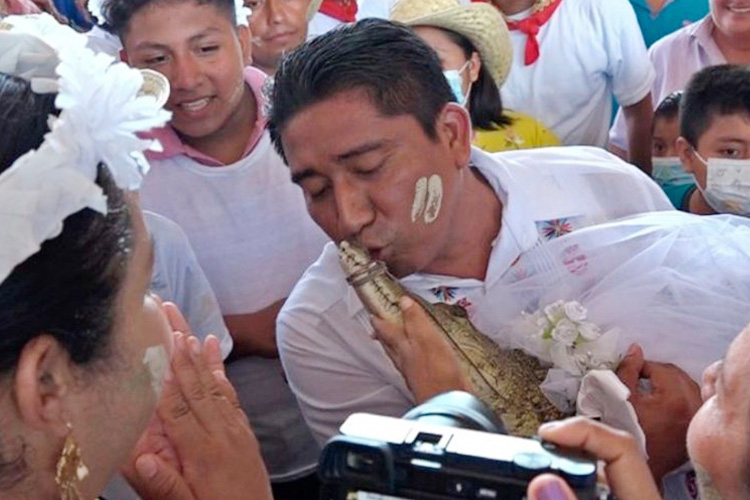Mexico elects Sheinbaum as its first woman president

Presidential candidate of the ruling Morena party Claudia Sheinbaum, gestures to her supporters after winning the presidential election, at Zocalo Square in Mexico City, Mexico. Reuters
Mexico’s projected presidential winner Claudia Sheinbaum will become the first woman president in the country’s 200-year history. “I will become the first woman president of Mexico,” Sheinbaum said with a smile, speaking at a downtown hotel shortly after electoral authorities announced a statistical sample showed she held an irreversible lead. “I don’t make it alone. We’ve all made it, with our heroines who gave us our homeland, with our mothers, our daughters and our granddaughters.”
“We have demonstrated that Mexico is a democratic country with peaceful elections,” she said. The National Electoral Institute’s president said Sheinbaum had between 58.3% and 60.7% of the vote, according to a statistical sample. Opposition candidate Xóchitl Gálvez had between 26.6% and 28.6% of the vote and Jorge Álvarez Máynez had between 9.9% and 10.8% of the vote. Sheinbaum’s Morena party was also projected to hold majorities in both chambers of Congress. The climate scientist and former Mexico City mayor said that her two competitors had called her and conceded her victory. The official preliminary count put Sheinbaum 28 points ahead of Gálvez with nearly 50% of polling places reporting.
The fact that the two leading candidates were women had left little doubt that Mexico would make history Sunday. Sheinbaum will also be the first person from a Jewish background to lead the overwhelmingly Catholic country. She will start her six-year term Oct. 1. Mexico’s constitution does not allow reelection.
The leftist has said she believes the government has a strong role to play in addressing economic inequality and providing a sturdy social safety net, much like her political mentor President Andrés Manuel López Obrador. Sheinbaum’s her victory suggests that the political movement López Obrador created will live on after his presidency. His anointed successor, the 61-year-old Sheinbaum led the campaign wire-to-wire despite a spirited challenge from Gálvez. This was the first time in Mexico that the two main opponents were women. “Of course, I congratulate Claudia Sheinbaum with all my respect who ended up the winner by a wide margin,” López Obrador said shortly after the electoral authorities’ announcement. “She is going to be Mexico’s first (woman) president in 200 years.”
If the margin holds it would approach his landslide victory in 2018. López Obrador won the presidency after two unsuccessful tries with 53.2% of the votes, in a three-way race where National Action took 22.3% and the Institutional Revolutionary Party took 16.5%. Still, Sheinbaum is unlikely to enjoy the kind of unquestioning devotion that López Obrador has enjoyed. In Mexico City’s colonial-era main plaza, the Zocalo, Sheinbaum’s win did not draw the kind of cheering, jubilant crowds that greeted López Obrador’s victory in 2018. Those present were enthusiastic, but comparatively few in number. “I promise that I am not going to let you down,” Sheinbaum said, once she arrived in the plaza. Sara Ríos, 76, a retired literature professor at Mexico’s National Autonomous University, celebrated after hearing that Gálvez had conceded. “The only way that we move forward is by working together,” Ríos said. “She is going to work to bring peace to the country, and is going to manage to advance, but it is a slow process.”
Fernando Fernández, a chef, 28, acknowledged challenges ahead while waiting to hear the results in the square. “You vote for Claudia out of conviction, for AMLO,” Fernández said, referring to López Obrador by his initials. But his highest hope is that Sheinbaum can “improve what AMLO couldn’t do, the price of gasoline, crime and drug trafficking, which he didn’t combat even though he had the power.” The main opposition candidate, Gálvez, a tech entrepreneur and former senator, had promised to take a more aggressive approach toward organized crime. In her concession speech, she said “I want to stress that my recognition (of Sheinbaum’s victory) comes with a firm demand for results and solutions to the country’s serious problems.” Nearly 100 million people were registered to vote and turnout appeared to be about 60%, similar to earlier elections. Voters were also electing governors in nine of the country’s 32 states, and choosing candidates for both houses of Congress, thousands of mayorships and other local posts, in the biggest elections the nation has seen and ones that have been marked by violence.
The elections were widely seen as a referendum on López Obrador, a populist who has expanded social programs but largely failed to reduce cartel violence in Mexico. His Morena party currently holds 23 of the 32 governorships and a simple majority of seats in both houses of Congress. Sheinbaum promised to continue all of López Obrador’s policies, including a universal pension for the elderly and a program that pays youths to apprentice. The persistent cartel violence and Mexico’s middling economic performance were the main issues on voters’ minds. Julio García, a Mexico City office worker, said he was voting for the opposition in Mexico City’s central San Rafael neighborhood. “They’ve robbed me twice at gunpoint. You have to change direction, change leadership,” the 34-year-old said. “Continuing the same way, we’re going to become Venezuela.” On the fringes of Mexico City in the neighborhood of San Andres Totoltepec, electoral officials filed past 34-year-old homemaker Stephania Navarrete, who watched dozens of cameramen and electoral officials gathering where frontrunner Claudia Sheinbaum was set to vote.
Navarrete said she planned to vote for Sheinbaum despite her own doubts about López Obrador and his party. “Having a woman president, for me as a Mexican woman, it’s going to be like before when for the simple fact that you say you are a woman you’re limited to certain professions. Not anymore.” She said the social programs of Sheinbaum’s mentor were crucial, but added that deterioration of cartel violence in the past few years was her primary concern in this election. “That is something that they have to focus more on,” she said. “For me security is the major challenge. They said they were going to lower the levels of crime, but no, it was the opposite, they shot up. Obviously, I don’t completely blame the president, but it is in a certain way his responsibility.” López Obrador claims to have reduced historically high homicide levels by 20% since he took office in December 2018. But that’s largely a claim based on a questionable reading of statistics. The real homicide rate appears to have declined by only about 4% in six years.
Just as the upcoming November rematch between US President Joe Biden and former President Donald Trump has underscored deep divisions in the U.S., Sunday’s election revealed how severely polarized public opinion is in Mexico over the direction of the country, including its security strategy and how to grow the economy.
Associated Press







